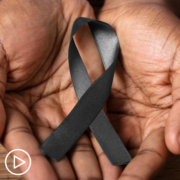How Is Relapsed or Transformed Follicular Lymphoma Treated?
How Is Relapsed or Transformed Follicular Lymphoma Treated? from Patient Empowerment Network on Vimeo.
Follicular lymphoma (FL) expert Dr. Jane Winter explains relapsed or transformed follicular lymphoma and outlines treatment approaches for these FL types.
Dr. Jane Winter is a hematologist and medical oncologist at Robert H. Lurie Comprehensive Cancer Center at Northwestern University. More information on Dr. Winter here.
See More from The Pro-Active Follicular Lymphoma Patient Toolkit
Related Programs:

Follicular Lymphoma Treatment Decisions: What’s Right for You? |

What Treatment Options Are Available for Relapsed Follicular Lymphoma? |

|
Transcript:
Laura Beth:
Dr. Winter, what happens if a patient’s follicular lymphoma relapses? What is the approach to treatment?
Dr. Winter:
And so, generally, it’s probably one in five patients whose disease sort of comes back and becomes somewhat problematic requiring repeated therapies where many, many patients have a very kind of indolent course that may require treatment intermittently, but tends to be very amenable to treatment. And then the other point to be made about follicular lymphoma is indeed that a fraction of patients every year will go on to what we call transform. That means their disease acquires and changes biologically or at least a clone of their disease changes and becomes a much more aggressive process similar to a newly diagnosed diffuse large B-cell lymphoma, an aggressive lymphoma.
And these transformations then require treatment as if they were an aggressive lymphoma. And they also, despite being somewhat frightening because of the sense of changing from a low-grade to a more aggressive process, in very many cases, these are well treated with standard, especially in patients who haven’t had prior therapy for follicular lymphoma, which is rituximab (Rituxan), these patients are well treated with our standard treatment for aggressive lymphoma Rituxan CHOP chemotherapy, and do very well. So, even though that sounds like a frightening occurrence, for the vast majority, it’s very treatable.
And patients go into remission and stay in remission for the most part, so it’s not as frightening as it might sound. And how many patients and when do they transform? There’s lots of confusing data. Basically, there’s some data that suggests that the majority of patients transform early in the first five years, whereas other data suggests that it’s sort of every year, patients are at risk so that the longer you have follicular lymphoma, perhaps, the greater the risk overall of this kind of change in the biology. But, as I said, for a good significant number of patients, this is relatively easily treated with standard chemotherapy.
Just another point in terms of potentially curative therapies these days, we’re afraid to use that term in follicular lymphoma because it does have this tendency to sort of keep coming back over time. So, whether any treatment is truly curative remains to be seen. Perhaps a very, very small fraction of patients might be eligible, young patients, for an allogeneic stem cell transplant from someone else. But, this is not commonly pursued these days, as well as a new therapy called CAR T-cell therapy, which is a form of immunotherapy and may indeed be curative.
But at this point, it’s really too early to make a claim of cure with that strategy. But, a very exciting new immunotherapy as well as some other new immunotherapy is something called “bite cells,” which harness our own immune system, much like the CAR-T cells do. So, lots of new things. So, these are exciting times for us as treating physicians and hematologists, but they are exciting times for patients because we have so much to offer.










